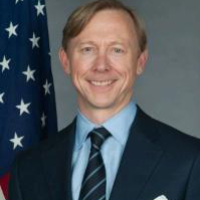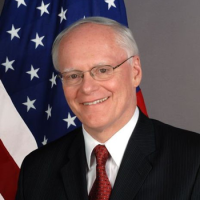War in Yemen: Implications for Regional and U.S. Security
On January 17, the conflict in Yemen reached new levels when Yemeni Houthis, an Iranian-backed rebel group, launched a drone attack against the United Arab Emirates. The strike ignited several weeks of escalation as the Saudi Arabia-led military coalition, of which the UAE is a member, targeted Houthi strongholds and camps. These events unfolded amid a backdrop of one of the worst humanitarian crises in modern times, as the seven-year civil war ravages Yemen’s population, infrastructure, and security. This discussion featured experts from both Yemen and the United States to unpack the political, security and humanitarian dimensions of the war in Yemen, as well as how the Biden Administration can mitigate risk while working with its allies in the region to counter the offensive threats.
A path towards peace
“There needs to be more policy decisions with teeth that will actually move the balance of power right now and do something against the Houthi group on the ground that has a monopoly on violence,” Fatima Abo Alasrar said. Most important is eliminating military violence from the lives of the Yemeni people. This requires enough pressure to compel the Houthis to enter negotiations. Given the rebel group operates outside of the global economic system, traditional sanctions regimes do not hold Houthis accountable for their violent actions. According to Brian Hook, “Step one is restoring deterrence, step two is changing the cost-benefit analysis for the Houthis continuing to not seriously engage in talks and diminishing Iranian influence.”
The panel urges a Yemen-led solution to achieve a sustainable end to the conflict. However, regional and international interests muddy this effort, as the civil war is largely fueled by external powers. “The various parties have international backers which complicate the conflict so that it has regional implications,” said Katherine Zimmerman. She added the recent escalation signals, “we are at a position now where regional conflict is much more likely. And I’m afraid it could be sparked from an event in Yemen.”
A multitude of rivalries
The Saudi Arabia-Iran rivalry has heightened the stakes of the Yemen conflict. Saudi Arabia aims to control the Bab Al-Mandab strait and protect its oil fields against Houthi rebels. While Iran fuels the Houthis with financial resources and weaponry to expand and even hold western trade and Saudi Arabia hostage through continued threats along the strait. Although, Hook contends the conflict goes much deeper than that. “There is no peace in Yemen through Saudi-Iranian rapprochement. The Houthis are still an autonomous actor inside of Yemen. The Houthis perceive themselves not to be subordinated by the Iranian interest, but as partners and allies to the Iranian state.” Internally, efforts to unify Yemen have largely failed due to the many factions with diverse goals, including the Houthis, northern Yemenis, and southern Yemenis. The international community must help to clarify the morality of certain groups’ actions.
Civil society
Civil society still plays an important role in the lives of Yemenis. Alasrar argued, “Yemen continues to be a place with a very active civil society scene, including the Social Fund for Development which is a sort of parallel government,” that offers necessary welfare services. In this way, local organizations are a critical resource amid one of the world’s worst humanitarian crises. Yemen’s civil society can be integral to moving the needle closer to a political solution. Asher Orkaby elaborated, “I still hold out an optimistic hope for a resolution in Yemen. That hope is one that has a regional and global dynamic and a local dynamic. It is both domestic and has regional implications, one cannot be solved without the other.”
Speakers




Introduction

Moderator

Former ambassador to Iraq and Turkey, and Special Envoy to the Global Coalition To Defeat ISIS
Hosted By

Middle East Program
The Wilson Center’s Middle East Program serves as a crucial resource for the policymaking community and beyond, providing analyses and research that helps inform US foreign policymaking, stimulates public debate, and expands knowledge about issues in the wider Middle East and North Africa (MENA) region. Read more
